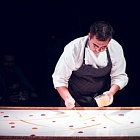Food Safety
Probably the most common bacteria involved in food poisoning is the salmonella e-coli and listeria bacteria. Fortunately our immune systems can handle bacteria in small amounts, but if allowed to multiply in our food by means of improper handling, cooking, or storage, bacteria can wreak havoc with our digestive systems.
It\’s been said that cleanliness is next to Godliness, and in the kitchen, and that saying couldn\’t be more true. Common breeding grounds for bacteria are kitchen towels, dish rags, and brushes, cutting boards, kitchen sinks, door, drawer and refrigerator handles. little things like timers, whisk handles, pepper mills and salt shakers also become breeding grounds for bacteria. You can also add bottles of oil, spice jars, can openers and the controls on your stove or ovens. Of course these are the storage places for bacteria in the kitchen. The culprit is of course, chicken and other poultry, eggs in and out of their shells, raw meats, dairy products, and yes even the fresh fruits and veggies you just bought from thesupermarket.
So now that we know what causes food poisoning, what can we do to prevent it? Aside from washing your hands frequently with an anti-bacterial soap (found in all supermarkets), here is a list of things you should do in your kitchen.
1. Wash poultry in ice cold water when you bring it home from the supermarket and refrigerate immediately. Cook it as soon as you can.
2. Wash your hands and everything else that comes in contact with that poultry. Even after you have washed it, it still harbors bacteria.
3. So not use knives, cutting boards, towels or anything else that touched that raw poultry without washing them. This means don\’t use the cutting board or knives to chop vegetables or anything else that will not be cooked immediately.
4. Wash your hands after going to the bathroom. Your family is not immune to your personal e-coli!
5. Wash all vegetables immediately after you bring them home from the market. This includes all fruit including watermelons, strawberries, peaches, mangos, grapes, and almost every other fruit including bananas. We have been trained to wash off insecticides from fruits, but even organic fruits and vegetables are picked by humans that do not wash their hands after using a chemical toilet in the fields. No one washes them before you use them, and these might even be hands before you made your purchase.
6. Use a lot of paper towels that can be thrown away. Dish rags and towels are one of the biggest breeding grounds for bacteria.
7. Keep your kitchen counters clean, and that means a diluted bleach or disinfectant before and after meal preparation.
8. Refrigerate foods as much as you can, and read the labels on condiments, sauces, jams and jellies and etc.to see if they need refrigeration after opening. DO NOT LEAVE MAYONNAISE ON THE COUNTER ON A SUMMER DAY! (That goes for anything made with the mayonnaise as well.
9. Gently wash eggs in ice cold water before putting them in the fridge. There is nothing sterile about an egg that came from the chicken coop. No! No one washed it before you bought it.
10. Buy your meat, especially hamburger, from a reputable butcher shop. Beware of butchers that stick metal signs in a roast or turkey or whatever. I\’m not sure he sterilized that sign after he pulled it out of a chicken last week.
11. Supermarket clerks! How many times do you see them wash their hands after taking someone\’s money, cleaning a floor spill or recycling empty soda cans before they manhandle your fresh vegetables?
12. Make sure you have a meat thermometer and make sure all meat is cooked to the proper temperature to kill the dangerous bacteria in meats, poultry and fish.
13. Wash your hands!! I can\’t repeat this enough!
14. Plan your grocery shopping so you go home immediately after you purchase perishable foods.
15. If fish smells like fish, don\’t buy it! If anything smells \“off\” or not what you are accustomed to, don\’t buy it.
16. If a can or jar whooshes when you open it, throw it away or better yet, take it back to the store.
17. Drain things over the sink, not in it. This place is teeming with bacteria. Sterilize it often, but still keep edible food out of it.
18. Pick up the dinner table immediately after dinner and refrigerate things that need refrigeration and wash things that need washing.
19. Wash your hands!
20. Teach your children all the above and they will suffer much less in life. And above all, TELL THEM TO WASH THEIR HANDS! This is one of the most inexpensive ways to prevent disease, food poisoning, and to live a long and healthy life.
Food дизайн Современный гость мероприятий стал более требователен, что требует от каждого игрока рынка выхода... |
Если Вам понравилась эта статья, пожалуйста, оцените её или поделитесь ею с друзьями, нажав на одну из расположенных ниже кнопок. Мы будем Вам очень признательны.
|
|
|
|
|
|









































